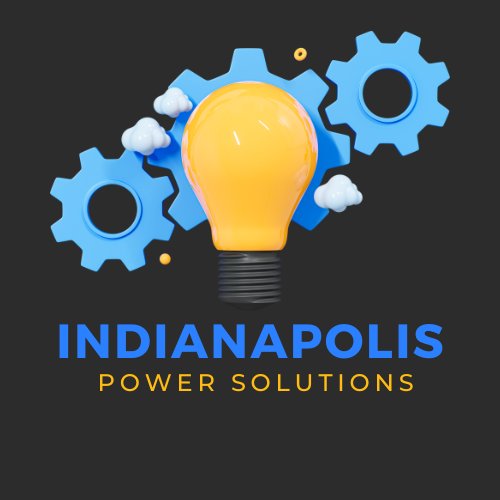
Whole House Generators in Crossroad IN
A whole house generator is a backup power system designed to provide electricity to your entire home during a power outage. Unlike smaller, portable generators, a whole house generator is permanently installed and connected to your home's electrical system. It runs on natural gas or propane, ensuring that you have a reliable power source for all your household needs, from lighting and heating to running appliances and electronics. Whole house generators come in various types, each suited to different needs and preferences:
- Standby Generators: These are the most common type, automatically kicking in when the power goes out. They are powered by natural gas or propane and can handle the entire electrical load of a home.
- Automatic Transfer Switch Generators: These systems include an automatic transfer switch that detects power outages and switches to the generator seamlessly.
- High-Efficiency Generators: Designed to use less fuel while providing the same level of power, these generators are ideal for those looking to save on energy costs.
How it Differs from Portable Generators
Whole house generators differ significantly from portable generators:
- Power Capacity: Whole house generators provide enough power to run your entire home, while portable generators typically offer less power, suitable for only a few essential appliances.
- Installation: Whole house generators are permanently installed and connected to your home’s electrical system. Portable generators are movable and require manual setup and connection during an outage.
- Fuel Source: Whole house generators use natural gas or propane, which means you don’t need to worry about refueling. Portable generators run on gasoline, which requires regular refueling and storage.
- Automatic Operation: Whole house generators start automatically during an outage, whereas portable generators need to be started manually.

We will get back to you as soon as possible.
Please try again later.
Professional Installation vs. DIY
When it comes to installing a whole house generator, professional installation is highly recommended over a DIY approach. Here’s why:
- Complexity: Installing a whole house generator involves connecting it to your home’s electrical system, setting up a fuel supply, and ensuring proper ventilation. Professionals have the expertise to handle these complex tasks safely.
- Code Compliance: Professional installers ensure that the installation meets local building codes and regulations, which is crucial for safety and legal reasons.
- Warranty: Many manufacturers require professional installation to validate their warranty. DIY installation might void this coverage.
Maintenance and Troubleshooting
To keep your whole house generator running smoothly, regular maintenance is essential:
- Routine Checks: Schedule regular inspections to check the oil levels, coolant, and fuel system. Ensure that the generator starts up correctly and runs without issues.
- Battery Maintenance: The generator’s battery should be tested regularly to ensure it is in good condition and capable of starting the generator when needed.
- Cleaning: Keep the generator clean and free from debris. Check the air filters and replace them if necessary.
If you encounter issues, refer to the user manual or contact a professional for troubleshooting. Common problems include fuel supply issues, battery failures, or starting problems.
Long-term Savings and Investment Value
Investing in a whole house generator can offer significant long-term savings:
- Avoiding Costs: By ensuring continuous power, you avoid potential damage to appliances and food spoilage during outages, which can save you money.
- Increasing Property Value: Homes equipped with a whole house generator are more attractive to buyers, potentially increasing property value.
- Lower Insurance Premiums: Some insurance companies offer discounts for homes with backup power systems, helping you save on premiums.
What are the Benefits
The benefits of having a whole house generator are numerous:
- Uninterrupted Power Supply: Enjoy peace of mind knowing that your home will remain powered during outages, keeping all systems operational.
- Enhanced Safety: Avoid the risks associated with power outages, such as loss of heating or cooling, which can be particularly important in extreme weather conditions.
- Convenience: No need to manually start a generator or manage fuel. The whole house generator works automatically and silently in the background.
What We Offer
We specialize in providing high-quality
whole house generator installation in Crossroad, IN. Our offerings include:
- Residential Generators
- Commercial Generators
- Portable Generators
- Electric Generators
- Propane Generators
- Solar Generators
- Generator Repairs
- Generator Maintenance
- Generator Parts
How to Choose the Right Generator For Your House
Selecting the right generator involves considering several factors:
- Power Needs: Assess your home’s power requirements to determine the generator size that will meet your needs during an outage.
- Fuel Type: Choose between natural gas or propane based on availability and convenience.
- Budget: Consider both the initial cost and long-term operating expenses when selecting a generator.
- Space and Placement: Ensure you have adequate space for installation and that the generator can be placed in a location that allows for proper ventilation.
Importance of Reliable Power in Homes
Reliable power is crucial for maintaining comfort, safety, and productivity in your home. Power outages can disrupt daily activities, damage sensitive electronics, and lead to food spoilage. A whole house generator ensures that your home remains powered and secure, providing a reliable solution to power interruptions.
Frequently Asked Questions (FAQs)
- How long does a whole house generator run during an outage?
A whole house generator can run for as long as there is a fuel supply. The runtime depends on the generator’s fuel capacity and consumption rate.
- How much does a whole house generator cost?
Costs vary based on the generator size, installation complexity, and additional features. It’s best to get a personalized quote from a professional.
- Can I install a whole house generator myself?
While DIY installation is possible, it’s recommended to hire a professional to ensure safety and compliance with local codes.
- How often should I service my generator?
Regular maintenance is recommended every six months or as specified by the manufacturer to ensure reliable operation.
If you’re ready to secure reliable power for your home with a whole house generator, contact us today. Our team is here to help you choose the best solution, provide expert installation, and offer ongoing support. Reach out to us for more information. Don’t wait for the next power outage—prepare your home with a whole house generator now!
Let's Connect!
Ensure your home stays powered. Our whole house generators are your best defense against unexpected outages, keeping your family safe and comfortable. Discover how whole house generators work and why they're crucial for your home. Check out our buyer's guide to find the perfect fit for your needs and protect against the common reasons for loss of power. Contact us now!